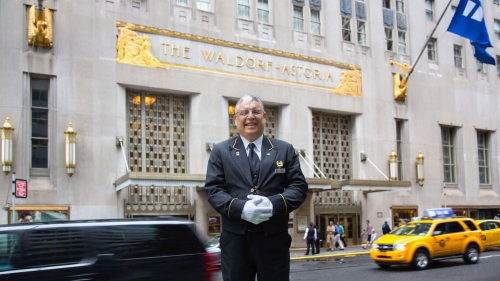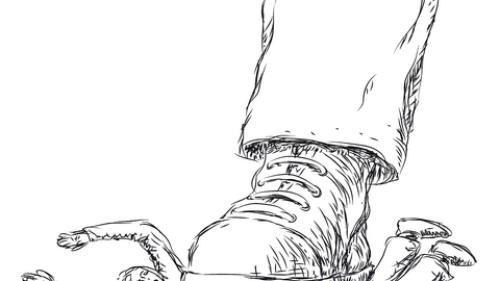Latinos Turning to Islam Are Increasing
The Alianza Islamica has bounced from East Harlem to the Bronx, buffeted by local resentments. Like its green- lettered sign, hanging crookedly close to the ground in front of its brownstone, it is keeping a low profile for now.
As a touchstone for Latino Muslims, Alianza endures a little-known but growing population and one of the more surprising examples of the kaleidoscopic nature of Islam in America. It is a population trying to assert itself through community organizations like Alianza Islamica, Web sites and publications.
It is also a subset of American Islam that endures a particular set of pressures, and presents an unusually diverse set of paths to the faith. Alianza Islamica, founded in 1975, is one of the oldest organized Latino Muslim groups in the United States. It found a home at Lexington Avenue, off 107th Street, in East Harlem in 1985, serving as something of a community center as well as a mosque. It took a stand against crime in the neighborhood and tried to spread the word of Islam. It had to move in 1997 because the landlord raised the rent, something that angered Alianza's leadership, which had expected better treatment from a fellow Muslim.
Like many converts, many Latino Muslims face the charge by Muslims who have immigrated from the Arab world or Asia that they are not authentic, because they do not speak Arabic, the language of the Koran, or because they do not adhere to certain religious practices. Those critics may be reacting to stereotypes of Hispanics as hot-tempered or promiscuous, said Ibrahim Gonzalez, an Alianza founder. "We have a stigma in the American culture," he said. At the same time, Latino Muslims are open to the charge of abandoning their Hispanic culture when they convert.
Catholicism is so ingrained in the Latino community that converting to Islam is "sort of like changing out of being Hispanic," said Samantha Sanchez, a Muslim who is pursuing a doctorate in cultural anthropology at the New School University. Mr. Gonzalez has heard the same message. "They say, 'You're not Puerto Rican because you're not eating pork,' " he said.
The Alianza faced more problems in East Harlem when frictions arose with members of a Latino evangelical church that Mr. Gonzalez said harassed Alianza members out of fears that they were trying to convert people. Those problems ended when the Alianza moved to Alexander Avenue in Mott Haven, the Bronx, three years ago. Its headquarters is a block away from the Tercera Iglesia Bautista Espaola, a grand old Spanish Baptist church founded in 1933. The pastor there, the Rev. Jose D. Rivera Tormos, sounded both bemused and skeptical about his neighbors. "I wonder sometimes why they embrace such a doctrine," he said. "I don't know that many Hispanics understand." Perhaps, he said, young people are looking to break with the traditional religion of their parents.
He said he doubted the center would be successful in converting people, because the Koran is full of what he called "contradictions," and because Islam again, in his view is not so popular these days.
Mr. Gonzalez bristles at the reactions of his Latino neighbors. "It's not like we were invading," Mr. Gonzalez said of his days in East Harlem. "We're from there. We were there with a different philosophy. We were there to educate people."
Nevertheless, the Alianza has taken a lower religious profile and focuses on social services, like making referrals for AIDS counseling and helping people obtain high school equivalency diplomas. Alianza also offers religious and Arabic instruction, and have held forums about Islam in the aftermath of the World Trade Center attack." We've just adapted ourselves to whatever is the necessity," Mr. Gonzalez said.
Nationwide, Latino Muslims number in the low tens of thousands, according to their own estimates and those of national Islamic bodies. They are mainly converts, concentrated in Southern California, Chicago, Miami and New York. They span the spectrum of Hispanic people, from recent Mexican arrivals to Puerto Ricans born on the mainland to Central American immigrants.
They are making their presence felt through groups like Alianza Latino, Piedad, which tries to bring together Latino Muslim women, and the Latino American Dawah Organization, which promotes the faith through a newsletter and a Web site, Latinodawah.org. Another site, HispanicMuslims.com, also tries to link people through the Web. The Islamic Society of North America has a Latino coordinating committee. Other groups publish the Koran and educational materials about Islam in Spanish.
The call of Islam comes in many ways to Hispanics, and as their numbers and visibility grow, so does the likelihood that more converts will follow. Some are women who convert because they are marrying Muslims; some come to Islam in prison; some are influenced by the growth of Islam among blacks in the neighborhoods they share; others are Latinos looking for cultural pride or a new spiritual path. Many are in rebellion against the Roman Catholic Church. For that church, the growth in Latino converts is a slice of a problem: the large outflow of Hispanic members, most of who gravitate to Protestant evangelical churches.
Ronaldo Cruz, executive director of the Secretariat for Hispanic Affairs of the United States Conference of Catholic Bishops, puts the number of departures from the church very roughly at 100,000 a year. He suggests many recent Latino arrivals do not feel comfortable in large Catholic churches, but he cannot fathom what the attraction of Islam is for them. "It's people 'in search of,' " he speculates. "They're not looking to adapt, they're looking to belong to something that rings affirming to them."
In New York, many Latinos are drawn to Islam as a way of reaching back to what they consider their true culture, the world of Islamic Spain that existed for more than 700 years after the first Muslim conquests in the eighth century. The process is similar to how some blacks view the adoption of Islam as an invocation of their African roots, said Hisham Aidi, a political science graduate student at Columbia University. He has studied Latino Muslims as part of a university project examining Muslim communities in New York City. At the same time, there has been a movement among scholars of Islam in recent years to show the religion's influence on Spanish culture, Mr. Aidi said. "These scholars are taking on these works of art and literature, considered unassailably Western, sacrosanctly Spanish, and showing how there's a strong Islamic influence, an Arab component, a Moorish component," he said.
For many Hispanics, turning to Islam is also a way of countering feelings of being downtrodden. "Islam historically has always started with slaves and moved up to kings," Mr. Aidi said. "In New York, you find a similar phenomenon. Islam is entering America through the streets, through the inner city, the ghetto, and the prisons. "The people who are most drawn to Islam tend to be minorities, African-Americans and Latinos, who feel they've been abandoned by the powers that be, by the government, by the Judeo-Christian heritage," Mr. Aidi added.
Mr. Gonzalez recalls the years after he demonstrated against the Vietnam War and for Puerto Rican independence. "Disco was taking over," he said. "The culture was becoming more commercial. We didn't want to give up the struggle, so we looked in different places. Islam represented a place for us to be part of a larger community. When we realized that within Islam there was every spectrum of people, regardless of class, regardless of race, we were attracted to that universal principle of human interaction and communion with the divine."

















